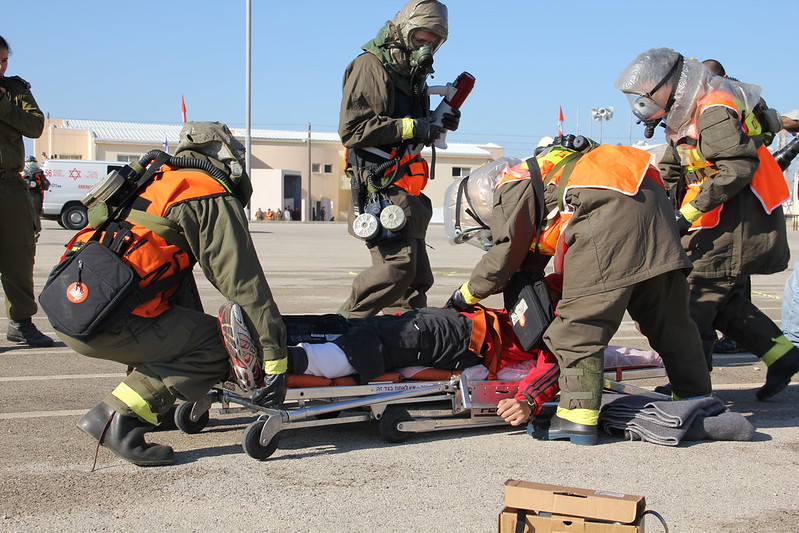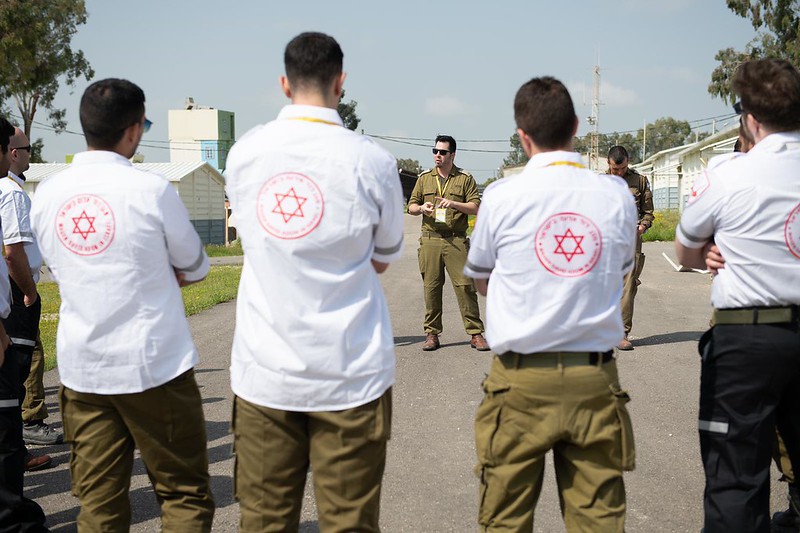Publications
INSS Insight No. 1281, March 25, 2020

Israel’s management of the coronavirus epidemic is proving to be one of the most challenging events since the establishment of the state. To judge by the emerging indications, this is a fourfold crisis, relating to public health, the economy, the national mindset, and politics. Given the intensity of the crisis and its likely intensification, the IDF has begun preparing for active and broad participation in the national effort to manage the crisis. First steps have already been taken, mainly by the Homefront Command (HFC). This article aims to examine the ramifications of involving the military in the management of the campaign, and to propose recommendations regarding its potential greater involvement.
Basic Assumptions for IDF Activation in a Protracted Crisis
- Israel is in the midst of an unfolding event that has the potential to pose a grave risk to personal, social, and national security. As it progresses under severe and unfamiliar directions, the challenge may well spiral into a protracted crisis with far reaching consequences, to the possible extent of a national disaster. Accordingly, every national resource must be mobilized for the national effort.
- The IDF operates, and must continue to operate, in accordance with the directives of the political echelon, in strict adherence to the law, and in keeping with its goals: defending the state, safeguarding its existence, and winning wars.
- As the “people’s army,” the IDF is the most significant potential resource available to the State of Israel: it has abundant resources and capabilities, manifests flexible operability, is experienced in managing mass emergencies on a national level, and is perceived by the Israeli population as its most trustworthy institution. The IDF should therefore be at the country's disposal and contribute where it can to the national effort.
There are several possible courses for involvement of the IDF in the management of the coronavirus epidemic. Based on what each of the tracks outlined below requires, it is necessary to weigh priorities and consider the issues that must guide any political decision on ways of deploying the IDF in the civilian domain.
First and foremost, it is important to ensure that the military can preserve all facets of its defense capabilities and sustain the functional continuity of its critical systems. Hence the critical importance to contain and arrest the spread of the virus within the military's ranks so as to allow it, under any circumstances, to fulfil its defensive mission in the best possible way. Second, the IDF is committed to uphold its particular responsibility for the West Bank, which includes the preservation of law and order in this region, and vis-à-vis the Gaza Strip, where the IDF has defensive responsibilities. The military must continue to implement these responsibilities while facing the challenge of the spread of the virus in the Palestinian Authority and in Gaza. At the same time, the IDF may be called to actively support the national internal effort in the face of expanded coronavirus risks.

The IDF may well face a scenario of broad simultaneous deployment along these three tracks. Presumably, the IDF would be able to perform such a combined effort if it expands the mobilization of reservists, conducts thorough planning, and redirects its capacities wisely. The IDF should already be prepared to deploy its assistance for the civilian effort gradually. This should all be done in anticipation of the unfolding next stages.
In the immediate and short term, while the civilian system manages the crisis primarily on its own: In such a situation, which could change quickly, the IDF must be poised to make its assets available to the state, while focusing particularly on increasing assistance in the medical and logistical fields.
The Homefront Command is pre-assigned to lead the IDF effort, due to its experience in working with the civilian domain, and its assets should be placed at the disposal of the state and its citizens. The HFC already assists with the important effort of public messaging, in accordance with the needs and directives of the civilian authorities. It also provides assistance on the ground to various elements, including the Magen David Adom (MDA) medical service, in running quarantine hotels and in presenting detailed information on its website, including what relates to the government ministries. As evolving circumstances require and in accordance with a government decision, the IDF can be expected to focus on further assistance to the Health Ministry, Israel Police, MDA, and other bodies as needed.
The intelligence community of the IDF and other security agencies must be certain that Israel's adversaries do not attempt to exploit the health situation and the confusion reigning in Israel to execute hostile activity of any kind.
In the longer term, and in the event of further broad spread of the virus, a substantive expansion of IDF activities within the civilian sphere may be required. This is likely to necessitate a broader mobilization of reservists. In this framework, the IDF would use its assets in areas such as command and control, logistics, transportation, and medical facilities and staff. It may also be required to deploy soldiers as auxiliaries for the Israel Police working to preserve public order and ensuring a full implementation of a possible broad lockdown. Such a scenario would give rise to direct contact, and potentially friction, between the military and civilians, which would require great sensitivity from the military in modes of engagement with the civilian population that it has not experienced since the 2005 disengagement from the Gaza Strip. This would constitute a challenge of great significance that requires organizational, social, and psychological preparation ꟷ both within the military ranks and among the civilian population. Meeting the challenge thus requires processes of careful planning, deliberation, and oversight that would also integrate civilian participants.
In the event of a mass disaster and if/when a special state of emergency is declared on the home front, the IDF might be required to take on the functional responsibility for managing, at least partially, broad components of the civilian national system that have been compromised, directly or indirectly, by the consequences of the epidemic. In essence this would mean the management of the civilian economy and the public by the IDF, in accordance with government directives.
In all of these scenarios, the IDF would have to take upon itself a number of caveats and limitations that aim for maximum assistance to the civilian population, with minimum direct responsibility. This means that the military should avoid making decisions where, how, and to what extent it is involved, leaving this solely to the political echelon. At the same time:
- The military activity must be subject to close civilian oversight, carried out by the cabinet and the Knesset Foreign Affairs and Defense Committee. This should occur not just in a general, remote fashion, but through specific supervision on the whole gamut of operations in the civilian domain.
- Great sensitivity and understanding is required by the military ꟷ both among the command ranks and, no less, among regular soldiers ꟷ as to the needs of the civilian systems, the needs of the greater public, and especially the needs of special sectors of the population (e.g., the ultra-Orthodox and Arabs), citizens in stress, and other at-risk groups. There must be adequate representation of female soldiers in the field as well as of civilians and relevant professionals (including psychologists, medical staff, and local public figures) in all levels of planning and execution of the involvement.
- It is incumbent upon the IDF to take measures, at both planning and execution levels, that would help prevent mistakes and guard against conduct that crosses ethical lines or harms or offends civilians in any way. The IDF should not be involved directly in policing and enforcement activities within the country, or in the use of any special surveillance tools.
- At all times, the IDF must operate within democratic norms, which mandate its subordination to the elected civilian echelon. Activation of the military should also be synchronized with the government’s strategy and practice for managing a state of emergency, while operating in close collaboration with other national and local agencies
In conclusion, IDF involvement in coping with a state of emergency arising from the coronavirus epidemic will be a true manifestation of the IDF as "the people's army" serving the people, rallying to the flag at a time of an extraordinary civilian emergency. The IDF will have to conduct itself sensitively, especially if the state of emergency persists and worsens, to the possible extent of social tension or breaches of public order. The military's conduct vis-a-vis civilians in acute distress is a challenge of the first order. The IDF is not prepared and trained for such missions, in which soldiers are forced to change familiar patterns of conduct regarding the Israeli public. Such an adjustment is very challenging and entails a cognitive switch, a high level of discipline, functional restraint, and flexibility. All of these necessitate exacting and comprehensive planning and preparation, at a level not experienced by the IDF. In these circumstances, the IDF will have to rely not only on its capacities but also accept close civilian oversight and professional civilian guidance while operating in these severe circumstances.


